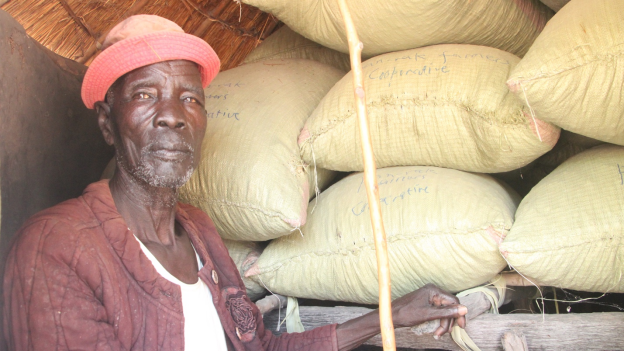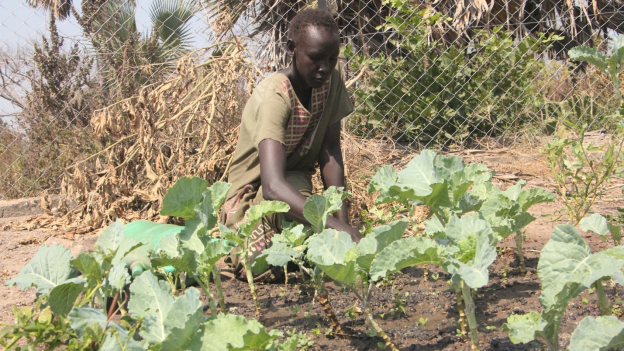
Deng Kur the Upper Nile State farmer showing what he has harvest compare to last year (credit Jenifer J. Ogawi)
On the outskirts of Renk County, Upper Nile State, farmer Deng Kur moves slowly across his cracked farmland, a straw hat shielding him from the harsh sun. Just a few years ago, this same field yielded sacks of sorghum, sesame, and groundnuts. Today, the soil is bare and dry, dust lifting with every step.
“I used to trust the sky,” Deng says, bending to run his fingers through the dry earth. “But now, it has turned against us.”
In 2023, Deng’s entire crop was washed away by flash floods. The following year brought drought. This season, he planted late, hoping to adapt—but the rains never came.

Nearly 800 kilometers away in Eastern Equatoria, outside Torit, Rose Anyijong faces a different but no less devastating reality. The 35-year-old mother of four kneels beside a row of struggling Sukuma Wiki plants. The rains came too late and too little. Some crops never sprouted at all.
“When you plant and nothing grows,” Rose says, “it breaks your heart. It breaks your spirit.”
Though they live in opposite corners of South Sudan, Deng and Rose are connected by the same invisible force: climate change. Once blessed with fertile lands and predictable seasons, the country’s agricultural zones are now gripped by erratic weather, rising temperatures, and failing harvests.
Deng remembers a simpler time. “April was for planting; August was for harvest. It was simple. Now, we have floods in May and drought in June.”
Rose has seen new threats emerge. “The heat brings pests we don’t understand,” she says. Insects, once rare in her highland village, now devour her Sukuma Wiki overnight. “They eat everything.”
These firsthand accounts of climate chaos have been being validated by regional experts.
The IGAD Climate Prediction and Applications Centre (ICPAC) forecast, released during the 70th Greater Horn of Africa Climate Outlook Forum (GHACOF 70) last month, indicates a 55% likelihood of above-normal rainfall across eastern South Sudan for the June to September season.
The forecast indicates a probability of heavier-than-usual rain in areas like Jonglei, Upper Nile, Unity, and Western Bahr el Ghazal.
This is now raising alarms about potential widespread flooding, a devastating experience all too familiar to the vulnerable population.
In response, ICPAC urged regional and national authorities to take proactive measures.
The government says it is on high alert as it braces for impending climate shock. South Sudan’s Minister of Humanitarian Affairs and Disaster Management, Albino Akol Atak says that at least 1.4 million people are expected to be affected by climate shocks and seasonal flooding in the coming months.
“The country is expected to experience above-normal rainfall, so we are also going to witness the same situation that we experienced last year in 2024,” the Minister said. “As the government, we are preparing ourselves.”
The flood warning is a symptom of a much larger disaster. According to a joint report by the government and three UN agencies, over 7 million people in South Sudan are projected to face severe food insecurity this year.
This is due to a combination of climate shocks, ongoing conflict, and economic hardship, where extremes like floods and droughts repeatedly disrupt agricultural production and cause displacement.
While officials prepare at a national level, the daily struggle for survival continues on the ground.
With each failed season, life becomes harder. Rose now relies more on wild fruits and food borrowed from neighbors. “Some days, my children eat once. Some days, they don’t.”
For much of the world, climate change is an abstract debate. But for smallholder farmers like Deng and Rose, it is a daily reality etched in empty granaries, the silence of failed fields, and the hunger in children’s eyes.
Women often bear the heaviest burden. “When food is gone,” Rose says, “it is the mothers who walk to other villages, who skip meals, who carry the shame.”
In quiet resistance, both have turned to community efforts. Deng recently joined a farmers’ group experimenting with drought-resistant seeds and water-trapping trenches, supported by a local church mission. “It helps, but it’s not enough,” he admits.
In Eastern Equatoria, Rose and other women have formed a savings group to buy seeds collectively. They swap farming tips and rotate child care to give each woman time in the field.
“We don’t want handouts,” Rose insists. “We want training, tools, and respect for what we do.”
Despite everything, Deng and Rose have not given up. They still wake before sunrise. They still plant. They still hope.
“This land raised me,” Deng says, gazing across the horizon. “If I abandon it, I abandon myself.”
Rose agrees. “Even if the rain forgets us, we must remember who we are. Farmers. Survivors.”

